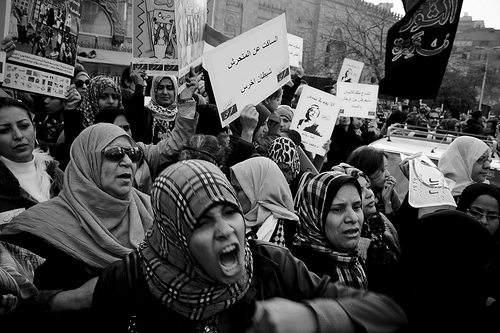Celebrated Egyptian Writer Fathiya Al-Assal Has Passed Away
by Hamdy El-Gazzar / June 30, 2014 / No comments
The iron-willed social activist and author of many novels, plays, and television series, leaves behind a legacy of courage and resistance.

Writer and political activist Fathiya Al-Assad was a pivotal figure in the Egyptian feminist community. Credit: Gigi Ibrahim via Flikr.
The Egyptian writer and political activist Fathiya Al-Assal was born on February 20, 1933, to a middle class family. Because of her controlling father, who never saw a reason for his daughter to be educated, she was not allowed to go to school. Married while just a teenager, Al-Assal was a young girl who didn’t know how to read or write when she was introduced to the left-wing playwright Abdallah Al-Toukhi.
In her autobiography Hodn Al-Omr (The Embrace of a Lifetime), which Al-Assal wrote in her characteristically informal language, she explains:
“I hesitated a lot to write about the sense of humiliation that happened in my childhood and in my adolescence due to the backwardness that prevailed at that time.”

- “From Egypt” attempts to draw a cultural map of Egypt and the Arab world by profiling the artistic, literary, and political issues that affect the region via on-the-ground coverage of current events, publications, and the fight for freedom of expression.

- Hamdy El-Gazzar is an Egyptian writer and one of the 39 young Arab writers included in the Beirut 39 Project. His first novel, Sihr Aswad (Dar Merit, 2005) won the prestigious Sawaris Award, and was subsequently translated by Humphrey Davies (Black Magic, AUC Press, 2007). His second novel, Ladhdhat Sirriyya (Secret Pleasures) was published by Dar al-Dar in 2008. He is currently working on a third novel.
However, this iron-willed young lady did not surrender to backwardness or masculine abuse. Instead she started her own life by learning to read and write. In 1957 she began to write creatively. The work that she produced was heavily affected by what she went through in her personal life, and discussed how this had contributed to her personality as a writer. She wrote about struggling through her circumcision as a child, and her relationship with her father. She also focused on social issues in general, and women’s issues in particular. Writing about women’s issues, in combination with her political activity, resulted in three separate detentions, but ultimately nothing stopped her from writing, continuing her fight for woman’s rights, and pushing for the renaissance of her society.
Al-Assal authored five novels in half a decade, including: Nisa’ Bila Aqni’a (Women Without Masks), Sijn Al Nisa’ (Women’s Prison), and Lailat Al Henna (Henna Night). In addition, she penned several plays, such as Al Morjeiha (The Swing), and Min Gher Kalam (Without Words). She also wrote 57 TV series, of which the well-known ones are: “Rommanat Al Mezan,” “Shams Montasaf Al Lail” (Midnight Sun), “Hibal Min Hareer” (Silk Ropes), “Badr Al Budoor,” “Hiya wal Mosataheel” (She and the Impossible), and “Hata La Yakhtaniq Al Hob” (So that Love Does Not Suffocate). Of course there was also her bold autobiography Hodn Al-Omr (The Embrace of a Lifetime), which won the 2004 State Award for Excellence in the Arts.
Fathiya’s novels feature women who resemble her exactly: They are ordinary and simple, but do not know the impossible; they never give up, and they possess a strong will to change their situation and the community around them.
Even at the age of eighty, Al-Assal was still struggling for freedom. One year ago, she was the most prominent of the well-educated Egyptians who were protesting about assigning a Minister of Culture that was related to the Muslim Brotherhood. She was also a board member of the Egyptian Writers Union, the president of the Egyptian Writers Association, and the General Secretary of the Progressive Union of Women. She ran for parliament several times between 1984 and 2000, but never won.
On Sunday, June 15, 2014, Fathiya Al-Assal passed away, effectively closing the book on a literary idol, a shining creative fighter, and a courageous woman.




